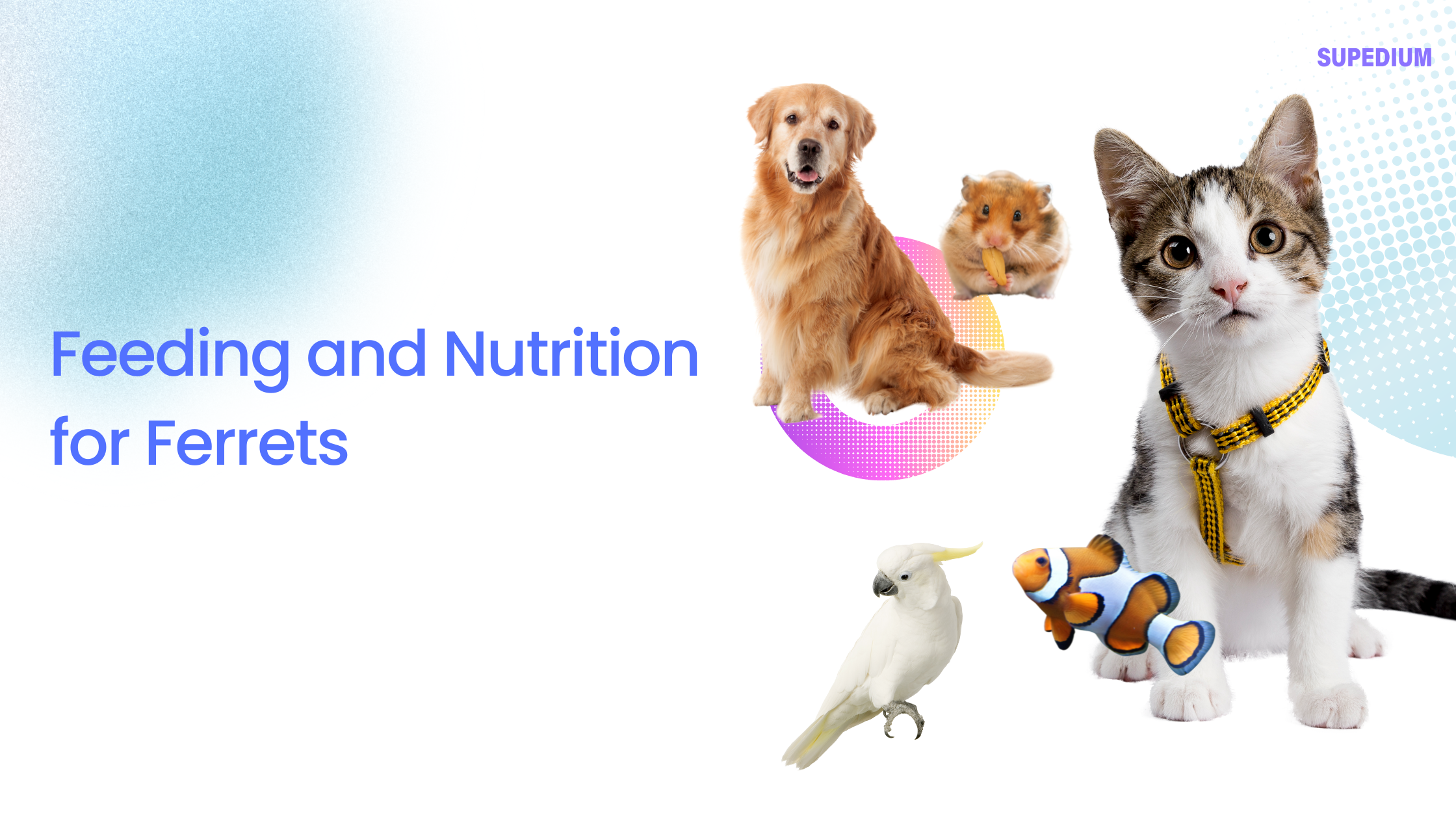Table of Contents
![]()
Introduction
Proper nutrition is crucial for the health and well-being of ferrets. These lively, carnivorous animals have specific dietary needs that must be met to ensure their longevity and quality of life. Understanding the unique nutritional requirements of ferrets, as well as the types of food available, is key to providing them with a balanced diet.
Basic Nutritional Requirements
Macronutrients
Proteins: Ferrets are obligate carnivores, meaning their bodies are designed to derive nutrients primarily from animal sources. Protein is essential for their growth, repair, and overall health. Ferrets require high-quality proteins that provide all the essential amino acids they need. Good sources include chicken, turkey, and fish. Commercial ferret foods are often formulated with adequate protein levels, but it’s important to check the ingredients and ensure they come from reputable sources.
Fats: Fats are a crucial energy source for ferrets and play a significant role in maintaining a healthy coat and skin. Essential fatty acids, such as omega-3 and omega-6, are important for various bodily functions. High-quality animal fats found in meats and fish are preferred. Ensure that the fat content in the diet is appropriate, as too much fat can lead to obesity.
Carbohydrates: Unlike many other pets, ferrets have a minimal need for carbohydrates. Their digestive systems are not designed to process large amounts of plant material. Foods high in carbohydrates, such as grains and vegetables, should be avoided or given in very limited amounts. Excessive carbs can lead to digestive issues and other health problems.
Micronutrients
Vitamins: Ferrets require a range of vitamins for optimal health. Vitamin A, essential for vision and immune function, should be provided in adequate amounts, typically found in animal-based proteins. Vitamin D is important for calcium absorption, and Vitamin E acts as an antioxidant. While commercial ferret foods usually contain balanced vitamin levels, supplementation might be necessary if deficiencies are detected.
Minerals: Key minerals such as calcium, phosphorus, and magnesium are vital for bone health and other physiological functions. The ratio of calcium to phosphorus is particularly important. Imbalances can lead to bone disorders. Ferret foods should have a balanced mineral profile to support overall health.
Types of Food
Commercial Ferret Food
Dry Kibble: Commercially prepared dry kibble is a common choice for feeding ferrets. It offers convenience and can be formulated to meet all the nutritional needs of ferrets. Look for high-quality kibble with high protein and fat content and minimal carbohydrates. Always check the ingredient list and avoid foods with fillers or artificial additives.
Canned/Soft Food: Canned or soft foods can be beneficial for ferrets, especially if they have dental issues or prefer moist food. However, they should complement, not replace, dry kibble to ensure a balanced diet. As with dry food, quality and nutrient content are key.
Raw Diet
Benefits of Raw Feeding: A raw diet, mimicking a ferret’s natural diet, can be very nutritious. It typically includes raw meat, organs, and bones. This diet can enhance coat condition, energy levels, and overall health.
Risks and Considerations: Raw feeding requires careful preparation to avoid bacterial contamination and ensure balanced nutrition. Consult a vet or a nutritionist to formulate appropriate raw diets and follow safe food handling practices.
Types of Raw Food: Options include whole prey (such as mice or chicks) or homemade raw recipes. These should be carefully balanced to include the right proportions of meat, organs, and bones.
Homemade Diets
Balanced Recipes: Homemade diets need to be well-balanced to meet all of a ferret’s nutritional requirements. This typically involves combining high-quality proteins with essential nutrients and vitamins. Recipes should be formulated with the help of a vet or pet nutritionist.
Supplementation Needs: Homemade diets often require additional supplements to ensure they are complete. These might include vitamins, minerals, and fatty acids. Regular veterinary check-ups are necessary to monitor nutritional adequacy.
Precautions and Risks: Homemade diets can lead to nutritional imbalances if not carefully prepared. Always consult with a veterinary professional before starting a homemade diet.
Feeding Guidelines
Portion Sizes and Frequency: Ferrets should be fed multiple small meals throughout the day, mimicking their natural hunting behavior. Typical recommendations suggest providing about 3-4 meals daily. Portion sizes should be adjusted based on the ferret’s age, weight, and activity level.
Feeding Habits: Free-feeding, where food is available at all times, is not usually recommended for ferrets due to the risk of obesity. Scheduled feeding is preferable to monitor food intake and maintain a healthy weight. Treats should be given sparingly, focusing on healthy options like small pieces of meat.
Special Considerations
Age-Related Nutritional Needs: Ferrets’ nutritional needs vary with age. Kittens (kits) require more protein and fat for growth. Adult ferrets maintain their health with a balanced diet, while senior ferrets may need adjustments in their diet to manage weight and dental health.
Health Conditions: Certain health conditions, such as diabetes or obesity, require specific dietary adjustments. Diabetic ferrets may need low-carbohydrate foods, while obese ferrets might benefit from weight management diets. Always follow your vet’s recommendations for managing health issues through diet.
Hydration: Fresh water should always be available. Adequate hydration is essential for digestion and overall health. Monitor water intake and ensure the water is clean and fresh.
Common Feeding Problems
Obesity: Obesity is a common issue in ferrets, often caused by overfeeding or high-fat diets. Prevent obesity by providing appropriate portion sizes, limiting treats, and ensuring regular exercise. Weight management diets can help address this issue.
Gastrointestinal Issues: Digestive problems, such as diarrhea or constipation, can arise from dietary changes or imbalances. Ensure a consistent, high-quality diet and consult with a vet if gastrointestinal issues persist.
Picky Eaters: Some ferrets may develop food preferences or become picky eaters. Encourage healthy eating habits by offering a variety of foods and avoiding excessive treats. Gradual introduction of new foods can help.
Supplementation and Vitamins
When to Use Supplements: Supplements may be necessary if a ferret’s diet is not providing all essential nutrients. Common supplements include vitamins and minerals. Use supplements as directed by a vet to avoid over-supplementation.
Natural vs. Commercial Supplements: Both natural and commercial supplements can be beneficial. Choose reputable brands and consult with a vet to determine the best options for your ferret.
Practical Tips for Feeding
Storing Food Properly: Store ferret food in a cool, dry place to maintain its freshness and nutritional value. Follow expiration dates and use sealed containers to prevent contamination.
Transitioning Between Foods: When changing a ferret’s diet, do so gradually over several days to avoid digestive upset. Mix the new food with the old food, gradually increasing the proportion of the new food.
Understanding Labels and Ingredients: Be informed about what goes into your ferret’s food. Look for high-quality protein sources and avoid foods with fillers, artificial preservatives, or excessive carbohydrates.
Conclusion
Providing the right nutrition is essential for a ferret’s health and happiness. By understanding their specific dietary needs, selecting appropriate foods, and following proper feeding practices, you can help ensure your ferret leads a healthy and fulfilling life. Regular veterinary checkups and careful attention to their diet will contribute to their overall well-being.
Share This





Be the first to comment